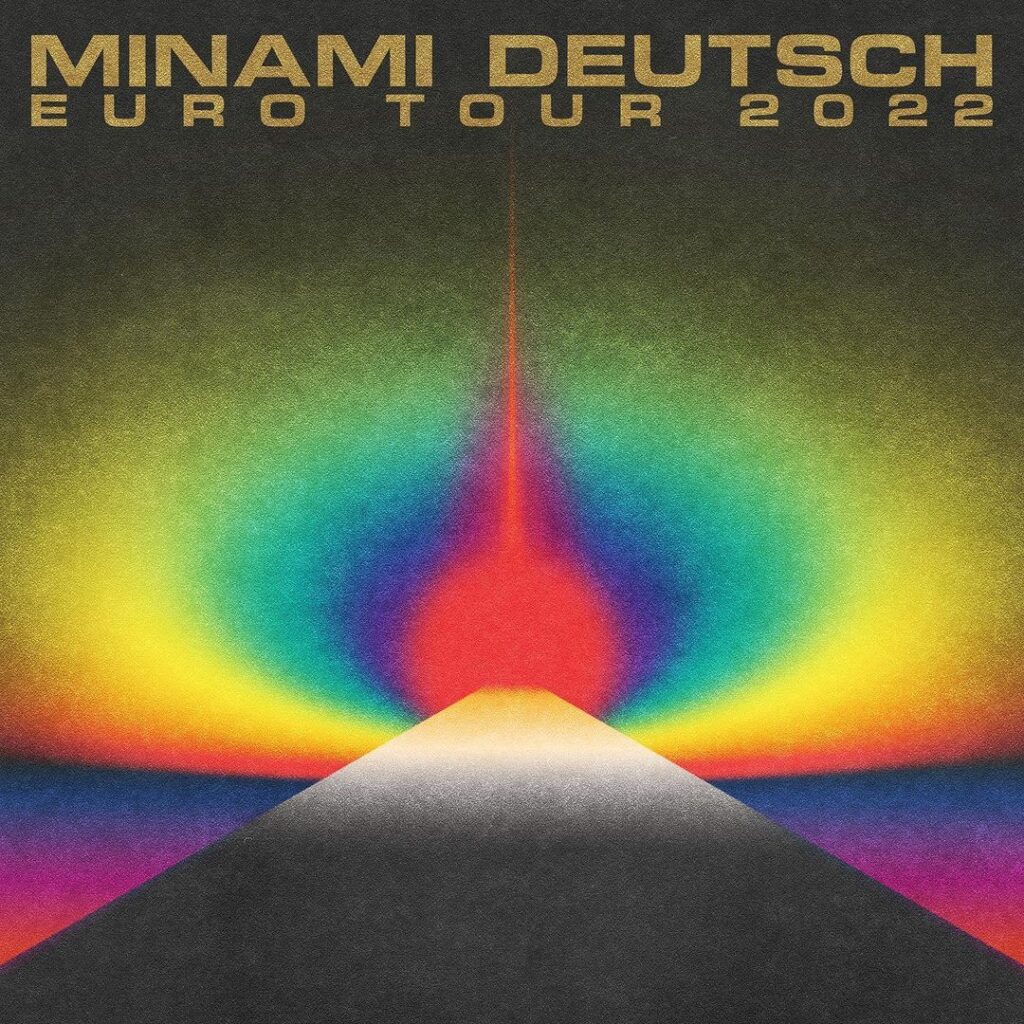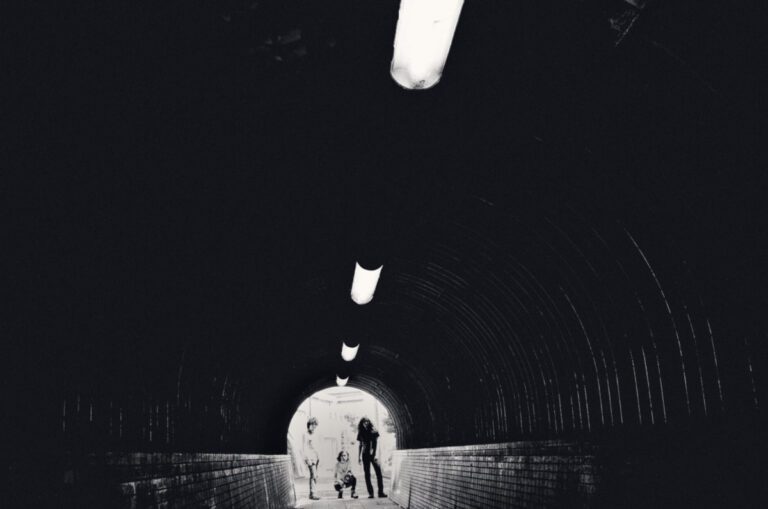Additional Information
Founded in 2014 in Tokyo around the figure of Kyotaro Miula, the name Minami Deutsch evokes the image of a fantastical Germany that potentially existed in the past but that we would especially like to see grow in the future. While Germany was divided between East and West during the krautrock era of the 1970s, the term Minami Deutsch, which means “South Germany,” perhaps represents the timeless Kosmische utopia of those off-the-ground musicians who sought to shatter the walls.
From one legacy to another, Minami Deutsch succeeds in resurrecting, fifty years later, the original essence and liberating spirit of this music. The well-kept secret of the German flying sauerkraut seems to be alive and well, and even more relevant and needed than ever. During the Roadburn festival in 2018, Minami Deutsch notably performed a recorded live set with the legendary Damo Suzuki, known for his inimitable freeing improvisation, which overflows like a delirious and incomprehensible stream of consciousness. Kosmische musik is thus not only a musical genre, but above all an avant-garde, surrealist and universal state of mind.
In addition to his interest in the famous motorik rhythm, Kyotaro Miula also likes to draw on the repetitive electronic rhythms of minimal wave and minimal techno for his remixes and his solo project Fagus Fluvialis, creating a kind of minimal motorik that is well worth a listen. Just before the notable opening act of French duo Le goût acide des conservateurs, who seeks to rouse a gas-sleeping France from its deep sleep, PAN M 360 caught up with guitarists Kyotaro Miula and Taku Idemoto when they played at the Supersonic in Paris for their European tour. Even if the language barrier may have been felt during the interview, the cosmic language, both quiet and spontaneous, transcends artificial walls and cerebral borders.
PAN M 360: The band Minami Deutsch started in 2014. Where did you guys meet each other ?
Kyotaro Miula: We met in Tokyo at a party organized by Kikagaku Moyo. They hold those parties once a month. So, Taku and I went there once and the collective started like this. We practice every week now together.
PAN M 360: You call yourself “repetition freaks”. What do you mean by that ?
Kyotaro Miula: I like minimal techno a lot, from the Chilean-german DJ Ricardo Villalobos for example. I actually like going to clubs and dancing. When there are a lot of different rhythms and cadences in a song, I find it hard to concentrate on dancing. I have a lot of trouble with sentimental songs, like love songs or ballads. In minimal techno, it can be about one simple bass line. I like repetition and constancy.
PAN M 360: Your first two albums are specifically centered around the motorik rhythm. What made you like this beat and krautrock in general?
Kyotaro Miula: Because of the kosmische ! You can focus on yourself with this kind of music. Psychedelic rock from the UK and USA feels more pop to me. This special German psychedelic rock can be darker or more experimental.
Taku Idemoto: It helps to go inside (he points to his heart with both hands).
PAN M 360: “Everyone has their own imagination about outer space”. What do you mean by that?
Taku Idemoto: Music can help you have inner vision. You can focus on the light here when you play music or during meditation (he points the middle of his forehead). Or when you take psychedelic drugs (laugh).
Kyotaro Miula: The inner vision is actually like outer space. Inner and outer are the same.
PAN M 360: Have you ever seen a UFO ?
Kyotaro Miula : Yes !
Taku Idemoto : It was full of colors, like a rainbow.
PAN M 360 : Kyotaro, you went to live in Berlin before recording the new album Fortune Goodies. Why did you decide to live there ? What was the purpose ?
Kyotaro Miula : I wanted to have an experience of this city because of my interest in German rock. I made contacts with some artists and musicians there. I don’t really like living in Japan as psychedelic rock is not very popular. There are too many businessmen, it’s so busy there. I don’t know what they are doing (laugh). There is no time to take it slow. Berlin feels more relaxed. I was in Neukölln district, which is more like a lower-class district. I wanted to avoid the posh areas and the suits men. I wanted to experience German life and the culture. I also like German movies, from the directors Michael Haneke and Rainer Werner Faussbinder. I saw the old movie Das Cabinet des Dr Caligari and I would like to watch Metropolis from Fritz Lang.
PAN M 360 : The artwork of this album was created by Noguchi Shimura. He’s going to have his solo exhibition “ありがto” (“thank you to”) presented at the Yorocobito Galery in Tokyo next month. What can you tell us about this artist ?
Kyotaro Miula : He’s very interesting. I simply found him on Instagram. As I was in Tokyo at the time, I contacted him and I managed to meet him. He’s older than me but at the same time, I feel we are the same age. He started his professional career when he was 30 years old. Before that, he never showed his artwork to anyone. He’s very talented but he’s also quite a strange guy, he spent nearly ten years on a particular drawing. In his art, I really like the symetrie, the motifs and the drawing structure. He usually put squares, circles and triangles. I like his collages.
Taku Idemoto : His work looks like religious paintings to me.
PAN M 360 : “I have never called the beat the Motorik myself. That sounds more like a machine and it was very much a human beat. It’s a feeling, like a picture, like driving down a long road or lane. It is essentially about life, how you have to keep moving, get on and stay in motion. To be driven by the drive, breaking on through”. This is a quote from the drummer Klaus Dinger, from the krautrock band NEU!. What’s your take on it ?
Kyotaro Miula : (he speaks japanese with the rest of the band for some time) We like what Klaus Dinger says. If you want the right rhythm, you can use the computer and do laptop music or something. A human drummer thinks about keeping the same rhythm but it’s clearly impossible. When you have slight variations, it’s a good feeling, we like it. It’s like being between a robot and a human. I like the motorik repetition but the slight changes make it more human.

























